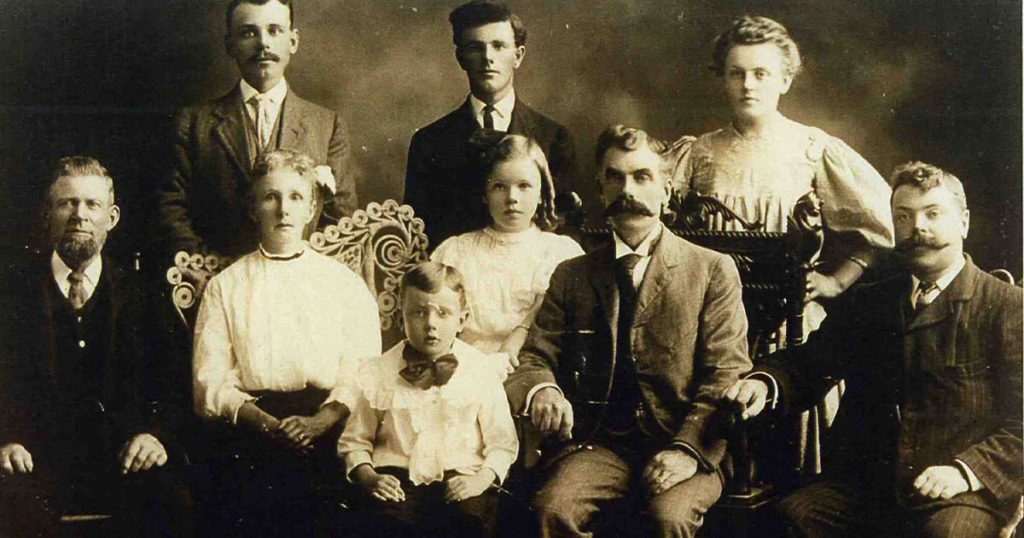
Ancestor Trouble: A Reckoning and a Reconciliation by Maud Newton; Random House, 400 pp., $28
A better title for Maud Newton’s new book would be Ancestor Obsession. She draws readers into a kind of personal haunted house where she carries out a monomaniacal quest to reconstruct the scaffolding of her family genealogy and, in doing so, expunge its ghosts. Her family’s story is rife with insanity, incest, child abuse, and multiple hellish marriages. Her attempt at “reckoning and reconciliation” with this sordid past, however, is more a case of wishful thinking that ends with her putting up an ancestor altar in her home and undergoing “ancestral lineage healing” therapy—an updated version of 19th-century spiritualism in which she talks to the dead so that she might forgive them. She even tracks down the burial spot of her mother’s grandfather, who died in an insane asylum, and puts a new headstone on his grave.
Newton’s obsession with heredity is an unsettling counterpoint to her abusive father’s toxic embrace of eugenics. He is portrayed as an angry, controlling, lying man convinced that he chose his wife in order to raise smart children and perpetuate his own lineage. Newton’s mother is the opposite: a free spirit, creative and generous, who adopts cats, trees, and strays of all sorts and finds her fantasy world in evangelical religion, setting up a church in the family’s living room. Maud Newton (her birth name is Rebecca, the pen name evidently borrowed from her “mysterious great-great aunt”) describes her own traits in terms of what she sees flowing from her parents. Like her father, she is a stickler for detail, stubborn in finding facts that fit her thinking. By exercising control over knowledge, she hopes she’ll be able to justify writing a 300-plus-page book about herself and, as her mother might fancy, find a mystical peace with her cursed kin.
Along with smartphones and other forms of visual media, the rise of memoir as a popular genre already suggests a heightened level of narcissism in recent American culture. But here, the word obsession seems to make more sense. Obsession originally meant “military siege,” according to its Latin roots and usage in early modern English; Newton’s memoir–cum–self-help guide is unrelenting in its aim of taking down her people. Obsession also connotes possession or entrapment, with Newton trying to escape from a veritable cage. But these days, it seems, instead of fearing obsession, people tend to revel in it: binge-watching is encouraged. As Lennard Davis observed in Obsession: A History (2008), modern society has taken obsession and turned it into the magic potion for genius, success, and dedication while redefining eccentricity, at least among upper-middle-class liberal elites, as a sign of authenticity. Davis, who teaches English at the University of Illinois at Chicago and has expertise in genetic testing, disability studies, and ancestor search practices, categorized obsession as a “portal into modernity”; his work helps to explain Newton’s impetus in fashioning a kind of time-travel adventure all her own, registering the dysfunctional ways of her ancestors so that she might return whole once the journey ends.
Throughout, Newton displays a love-hate relationship with her forebears. She can’t escape her own fascination with what I call “folk genetics”: seeing family resemblances and inherited patterns. She admits to biases but can’t quite give up the enchantment. “Over time,” she writes, “I had a dawning sense of something good and true and numinous at the core of my ancestry compulsion, a desire to heal by accessing a kind of divinity that was uniquely mine.” Her path inevitably leads to self-affirmation. In the end, she arrives at her modern self, somewhat paradoxically, via ancestry.com, epigenetics, and new-age spiritualism.
Although Newton mentions Eudora Welty in two instances, she seems reluctant to fully address the southern literary tradition. What interests her most are ancient ancestral customs—Roman, Chinese—distant and safer than her region’s monument fetish. She briefly explores her family’s ownership of slaves and asks for atonement, but that’s all. Her Mississippi grandmother aimed to erase all traces of Confederate nostalgia, throwing away 50 years of her mother’s plantation journals, so perhaps Newton internalized her no-nonsense “Granny,” who bears a resemblance to J. D. Vance’s Mamaw in Hillbilly Elegy—a stock character of rural fiction that has a long and complicated history.
Much of the territory Newton covers echoes some of the South’s greatest writers, such as Katherine Anne Porter, William Faulkner, and Welty, all of whom dealt with similar instances of incest, abuse, and insanity. Porter, whose maternal grandmother was placed in an asylum, feared for her own sanity; Faulkner’s books were denounced for their abnormality, and his characters, like Welty’s small-town eccentrics, addressed the past as it haunted white southerners. The disconnect may or may not be intentional—Newton doesn’t make it clear. Perhaps her obsession in cataloguing family traits reflects her professional training as an attorney: she compiles her family tree as if assembling the salient assets in a will and is less concerned with fleshing out the broader cultural and historical forces at work.
The other odd omission is her sister. A third of the way through the book, Newton attempts an apology (but how sincere?) to her sister for the “misfortune of having a memoirist for a sibling,” writing, “She has her own point of view, her own experiences to process. While we’ve always been close, she’s far more private than I am, and her small footprint in this book is intentional.” Maybe the older sister is seeking to protect the younger, yet she freely dissects and psychoanalyzes every other member of her extended family. She jokes that her parents “knew from the time that I was very small child that I wanted to be writer and they choose to carry on as they did anyway.” This statement is telling. Newton has every right to seek reparation on the printed page for the damage her parents inflicted, but the reckoning and reconciliation she aims at seem incomplete.

